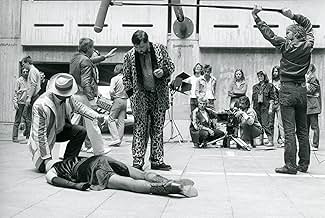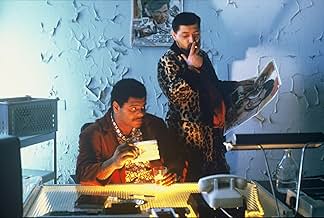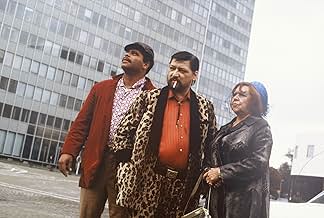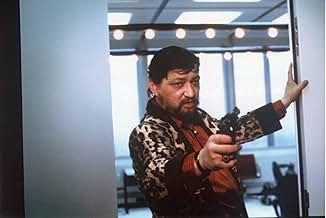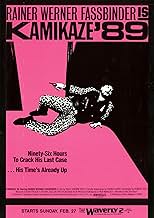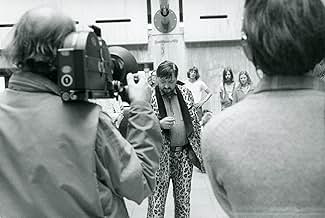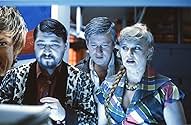In a totalitarian society of the future, in which the government controls all facets of the press, a homicide detective investigates a string of bombings, and finds out more than he bargaine... Read allIn a totalitarian society of the future, in which the government controls all facets of the press, a homicide detective investigates a string of bombings, and finds out more than he bargained for.In a totalitarian society of the future, in which the government controls all facets of the press, a homicide detective investigates a string of bombings, and finds out more than he bargained for.
- Director
- Writers
- Stars
- Awards
- 1 win & 3 nominations total
Andreas Mannkopff
- Wechselschichtregisseur
- (as Andreas Mannkopf)
Ute Koska
- Polizeiärztin
- (as Ute Fitz-Koska)
Hans-Eckart Eckhardt
- Polizist
- (as Hans-Eckhardt Eckhardt)
- Director
- Writers
- All cast & crew
- Production, box office & more at IMDbPro
Featured reviews
10hasosch
Wolf Gremm's "Kamikaze 1989" portrays a Germany that is rich, in which all problems are solved, where there is no pollution of the environment, where people work in sterile dust-free rooms with artificial light and air-conditioning, where alcohol is forbidden, since it causes incalculable reactions, where private persons are not allowed to grow vegetables on their own, since seeds may be contaminated, where there are, finally, no suicides anymore, but just cases of "unexpected death". The whole industry is in the hand of one gigantic concern, and all of its leading crew are family members. Competition is excluded, since creativity is dangerous. Even the handful of intellectuals who are working in the "cultural" department of the concern, have just to confirm the "intellectual" doctrine of the concern. Thus, the totalitarian company represents the good, because what is good is always associated with might (cf. the definition of the "axis of evil"). And since everything seems to be under control, the position of the evil is empty. However, strictly speaking, good cannot exist without evil and vice versa, because these ethic terms define one another logically. However, the position of evil is empty only until the company gets a bomb threat. It seems that the "spirit of evil", Krysmopompas, whose members once belonged to the "prokos", the intellectuals that used to work in the hidden 31st floor of the building, are behind the threat.
Police lieutenant Jansen, unforgettably played by Rainer Werner Fassbinder in his last role, is charged with the investigation, during which the open position of Krysmopompas is offered to him several times, but he refuses to take it over. Since the concern represents the good, the police must represent the evil. Even the police president is in the hand of the concern and looks like a caricature of Dr. Mabuse turned himself into a puppet. Possibly Jansen realizes that becoming Krysmopompas and thus fulfilling the vacuum of evilness would just consolidate the omnipotent concern, because it needs the evil to define itself as the good. Consequently, the director of the concern offers him a job, which Jansen also refuses. Therefore, Jansen takes a third position in a world in which there are only two, and this is presumably the reason why the movie is called "Kamikaze". However the title may be meant, this movie offers a highly complicated situation in which the categories of ethics are perverted. The typical 80ies' German TV-style of this movie should not make the audience blind that in portraying paradoxical ethical categories in a world in which metaphysics has been shoveled out like the alcohol, the seeds and suicide, "Kamikaze" goes way beyond thematically related movies like Godard's "Alphaville", Kubrik's "Dr. Strangelove" and even Tarkovsky's "Solyaris". A few years before "Kamikaze 1989", Fassbinder himself had directed the science-fiction movie "Welt am Draht" ("World on wire") which many people believe to have surpassed "Solyaris". In the final scene of Kamikaze, Fassbinder says his ultimate goodbye to his audience grinning in front of a picture of Armstrong's moon landing.
Police lieutenant Jansen, unforgettably played by Rainer Werner Fassbinder in his last role, is charged with the investigation, during which the open position of Krysmopompas is offered to him several times, but he refuses to take it over. Since the concern represents the good, the police must represent the evil. Even the police president is in the hand of the concern and looks like a caricature of Dr. Mabuse turned himself into a puppet. Possibly Jansen realizes that becoming Krysmopompas and thus fulfilling the vacuum of evilness would just consolidate the omnipotent concern, because it needs the evil to define itself as the good. Consequently, the director of the concern offers him a job, which Jansen also refuses. Therefore, Jansen takes a third position in a world in which there are only two, and this is presumably the reason why the movie is called "Kamikaze". However the title may be meant, this movie offers a highly complicated situation in which the categories of ethics are perverted. The typical 80ies' German TV-style of this movie should not make the audience blind that in portraying paradoxical ethical categories in a world in which metaphysics has been shoveled out like the alcohol, the seeds and suicide, "Kamikaze" goes way beyond thematically related movies like Godard's "Alphaville", Kubrik's "Dr. Strangelove" and even Tarkovsky's "Solyaris". A few years before "Kamikaze 1989", Fassbinder himself had directed the science-fiction movie "Welt am Draht" ("World on wire") which many people believe to have surpassed "Solyaris". In the final scene of Kamikaze, Fassbinder says his ultimate goodbye to his audience grinning in front of a picture of Armstrong's moon landing.
A futurism crime thriller was a different venue for Fassbinder, whose stature had grown lately with films in historical settings. Though he didn't direct "Kamikaze," it was helmed by fellow New German filmmaker Gremm & has the moody complexity for which both directors are known, as well as more action. In the near future, West Germany's economy (remember, the fall of Communism was yet unforeseen) has become the world's largest. Virtually all broadcast & print media are controlled by a single, family-run corporation whose head (Gober) styles himself "The Blue Panther" & carefully crafts an elaborate personality cult, including a line of action comics. You still have a lot to learn, Rupert Murdoch. A terrorism campaign against the company by a nebulous entity called "Krysmopompas" (more impressive than "Osama," more intelligent than "Carlos the Jackal") brings on a police investigation headed by the force's most famous detective, Jansen (Fassbinder), who's never failed to solve a case. Clues indicate that someone well-placed in the corporation is responsible, but Jansen soon learns that the company itself is trying desperately to keep secrets. Is Krysmopompas really just an element of the Blue Panther personality cult? The story from Swedish writer Wahloo's novel "Murder on the 31st Floor" is frighteningly accurate in some of its visions, including the rise of cheap, inane reality TV (the marathon laughing contest is a classic) & the creation of euphemistic, self-serving police propaganda machinery (there's no such thing as murder or suicide anymore, only "accidental death"). The props are gleefully, stylishly cheap & cheesy, including Jansen's pajamalike leopard outfit, which might be some sort of uniform (remember Sylvia Anderson's purple wigs in "UFO?"), the burly assassins in black lingerie, the 3-wheeler choppers of the police & the Superman executive phone. However, they're no more outlandish than those of the wildly popular "Mad Max" films (Tina Turner in chain mail, oh, my!). Fassbinder does a remarkable job of projecting an air of old-fashioned, authoritative competence from Jansen through the futuristic absurdity, in contrast to the bland, painted-smile routine of the other cops & the worried urgings of his dying chief (Marquis). His relationship with his temperamental, long-suffering sidekick Anton (Kaufmann, Fassbinder's frequent collaborator & longtime companion) adds a complex human touch to the film. The brilliant Jansen is curtly condescending & critical ("Don't use unnecessary words, MK1 Anton") while the energetic Anton is alternately effusive & sullen. The portrayals of the media executives & personalities are delightfully bizarre & over-the-top, but probably less enjoyable if you don't understand German. The futurism venue was probably a good one for Fassbinder & Gremm (the latter's copious work remains almost unknown in the US) to venture out of the art-house domain of New German Cinema while keeping much of the technique that they had developed. Despite its similarity to "Soylent Green," "Kamikaze" is far less literal & direct but stylish beyond the point of parody. Hardly the most important work of the New Germans, "Kamikaze" is a valuable film in the near-future genre that died out in the 1980s but is about due for a revisit.
A movie worth seeing for none other that three main reasons:
The absurdist exercise in retrofuturism.
The drunkenly charming performance of Fassbinder.
The colorful anarchism of a production design that rewrites all the rules of what was then known as cyberpunk.
The movie with his unbridled and convoluted plot owes way more to William Burroughs than William Gibson. The satire, in this unique cinematographic experience is more a direction chosen by director Wolf Gremm, than a clearly defined series of remarks that one can extract or decipher in the script. It is certainly witty and doesn't take itself seriously but you will hardly find any classically intended humour in the short and surreal lines of the actors.
However this is the true strength of the movie and what allows it, to stand the test of time.
First off, yes, you're right, this is a godawful movie.
Being a big Fassbinder fan, I rented this with excitement. Fassbinder stars, and he's always fun to watch. It's one of those punk-future-dystopian movies that popped out a bit in the early '80s, always good for some cult fun. It came out at the end of Fassbinder's career, and Fassbinder's whole 12 year filmmaking period only got better and better until his end.
So half way through I thought "what the hell happened? This movie is an atrocity exhibition."
Then I glanced at the cover, and in horror noticed this movie was NOT directed by Fassbinder. He just starred in it in a coked up narcisstic haze. I read he actually wore that leopard outfit he was giving in this movie on and off again in the last few weeks of his life.
Fassbinder was proud of this movie, somehow, and that gives it an odd charm. It's horrendous, but I haven't regretted watching it. There's a scene where Fassbinder climbs to a roof of a building, odd buzzing music is playing and the wind is blowing his hair and he has this perverse smile on his face as he gazes out across the city. There's also the ending where Fassbinder, bloated, in a robe, girates his body against a photo of an astronaut (I'm guessing this is Fassbinder's input, as the exact same ending pretty much is used in Stationmaster's Wife). These two scenes made it worthwhile. Otherwise, mark it off as an awful "Alphaville" rippoff.
Being a big Fassbinder fan, I rented this with excitement. Fassbinder stars, and he's always fun to watch. It's one of those punk-future-dystopian movies that popped out a bit in the early '80s, always good for some cult fun. It came out at the end of Fassbinder's career, and Fassbinder's whole 12 year filmmaking period only got better and better until his end.
So half way through I thought "what the hell happened? This movie is an atrocity exhibition."
Then I glanced at the cover, and in horror noticed this movie was NOT directed by Fassbinder. He just starred in it in a coked up narcisstic haze. I read he actually wore that leopard outfit he was giving in this movie on and off again in the last few weeks of his life.
Fassbinder was proud of this movie, somehow, and that gives it an odd charm. It's horrendous, but I haven't regretted watching it. There's a scene where Fassbinder climbs to a roof of a building, odd buzzing music is playing and the wind is blowing his hair and he has this perverse smile on his face as he gazes out across the city. There's also the ending where Fassbinder, bloated, in a robe, girates his body against a photo of an astronaut (I'm guessing this is Fassbinder's input, as the exact same ending pretty much is used in Stationmaster's Wife). These two scenes made it worthwhile. Otherwise, mark it off as an awful "Alphaville" rippoff.
I see in Kamikaze 1989 both echoes and premonitions of other much more famous films, all with considerably larger budgets. I recognize that this must be because all dystopic fiction commences from the two greats, Orwell's 1984 and Huxley's Brave New World. What subsequent creators have done is to put the pieces together in different orders, but the overarching totalitarian force governing the dystopic world, whether Blade Runner or The Hunger Games, Brazil, Robocop, or this obscure work not by but starring Rainer Werner Fassbinder, who in a bizarre reflection of a recurring trope of the film, himself became at the young age of 37, in the year 1982 (the year of this film's release), "ein unerwarteter Tod" = an unexpected death.
I am not sure whether this film would have been much better had it had the budget of Blade Runner or The Hunger Games, but I suspect that it would have been. On the other hand, we have grown accustomed to and now expect extremely fast-moving, often frenetic action in dystopic films. The pace here is incredibly slow, as though everyone is on some sort of downers (aside from the contestants in the Laughing Game, who are hooked up to IVs filled with hebephrenia-inducing drugs). Again: Huxley and Orwell already wrote it and others inspired by their works decided to dramatize the essence of dystopia.
Worth watching once, if only to see how later films may have been influenced by this creation.
I am not sure whether this film would have been much better had it had the budget of Blade Runner or The Hunger Games, but I suspect that it would have been. On the other hand, we have grown accustomed to and now expect extremely fast-moving, often frenetic action in dystopic films. The pace here is incredibly slow, as though everyone is on some sort of downers (aside from the contestants in the Laughing Game, who are hooked up to IVs filled with hebephrenia-inducing drugs). Again: Huxley and Orwell already wrote it and others inspired by their works decided to dramatize the essence of dystopia.
Worth watching once, if only to see how later films may have been influenced by this creation.
Did you know
- TriviaThis was the final acting role for Rainer Werner Fassbinder.
- GoofsThe movie claims 27 September 1989 to be a Monday, but that day was a Wednesday (The movie plays in 1989, as the title and a spoken intro make clear. The supposed explosion in the beginning of the movie was planned to take place on September 23, as Jansen points out. The chief of the police then urges Jansen to solve the case within for days, saying "until Monday afternoon," which would be September 27).
- Quotes
Policewoman: Suicide
Polizeileutnant Jansen: It would be the first in four years.
Policewoman: Sorry, I meant 'premature death.
- ConnectionsFeatured in Fassbinder (2015)
- How long is Kamikaze 89?Powered by Alexa
Details
Box office
- Gross US & Canada
- $22,440
- Opening weekend US & Canada
- $5,613
- Jun 5, 2016
- Gross worldwide
- $22,440
Contribute to this page
Suggest an edit or add missing content



